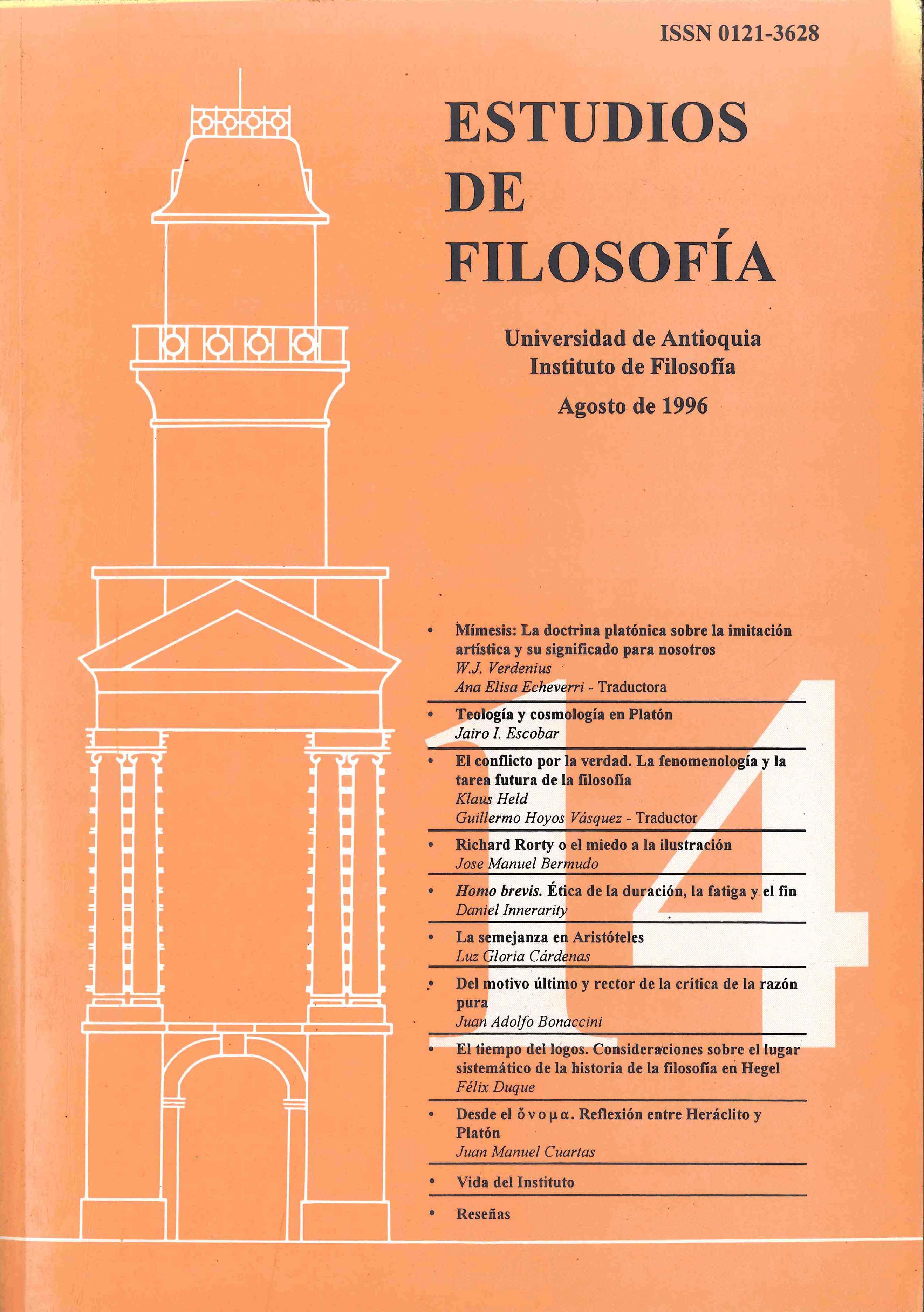Homo brevis. Ethics of duration, fatigue and the end
DOI:
https://doi.org/10.17533/udea.ef.338438Keywords:
Ethics, temporality, moralAbstract
As life, to which it is intended, philosophy must be brief This idea must restrict the very dominant universal and timeless character of Philosophical Ethics in its conception of virtue and law. Three aspects are examined. First, the temporal condition of human life, particularly positive consequences of such briefness. Second, the fact that beginnings and endings as context of human life are out of our control. And third, the anthropological sense of fatigue; this is, the idea that if good life must be carried out within time, and not despite it, the role of moral reflection is lo avoid two risks for human beings: overrating and undervaluing.
Downloads
References
ARISTÓTELES. Ética a Nicómaco. Madrid: Centro de Estudios Constitucionales, 1994. (citado como Et. Nic.)
___________, Metafísica. Madrid: Gredos 1994 (citado como Met).
ARREGUI, Jorge V. El horror de morir. El valor de la muerte en la vida humana. Barcelona: Tibidabo. 1992.
BARTH, Karl. Die kirchliche Dogmatik. Zürich: Evangelischer Verlag, 1932-67.
__________, Biblia de Jerusalén. Bilbao: Desclée de Brouwer, 1975.
BULTMANN, R. Das Evangelium des Johannes. Gottingen: Vandenhoek & Ruprecht, 1978.
DELEUZE, G., L 'épuisé, postface a S. Beckett. París: Quad, 1992.
DESCARTES, René, Régles pour la direction de l'esprit. En Oeuvres. Paris, Vrin, 1996.
DICKENS, Charles, Hard Times. Harmondsworth, Penguin, 1969.
HEIDEGGER, Martín, Sein und Zeit. Tübingen, Niemeyer, 1986.
LÉVINAS, Emmanuel. De L'existence a' l'existant. París: Vrin, 1947.
_________, Autrement qu'etre ou au-delà de l'essence. La Raye, Nijhoff, 1974.
LUHMANN, Niklas. Gesellschaftsstruktur und Semantik 1, Frankfurt, Suhrkamp, 1980.
MARQUARD, Odo. Freiheit und Zeit. Versuch, eine Frage zu stellen. En: Prinzip Freiheit. Eine Auseinandersetzung um Chancen und Grenzen transzendental philosophischen Denkens. Freiburg 1 München: Alber, 1979.
NIETZSCHE, Friedrich. Kritische Studienausgabe, ed. Colli-Montinari, Berlín, Walter de Gruyter, 1980 (citado como KSA).
ORÍGENES, Contra Celso. Madrid, Cátedra, 1967.
PLATÓN, República. Madrid, AguiJar, 1969.
SÉNECA, La brevedad de la vida. Madrid, AguiJar, 1966.
SPAEMANN, Robert (1996), «Aujhalter und letztes Gefecht», en Karlheinz Stierle/Rainer Warning, Das Ende. Figuren einer Denkform, München: Fink.
TERTULIANO. La Chair du Christ, París: Cerf, 1975.
DE AQUINO, Tomás. In decem libros Ethicorum Aristotelis ad Nicomachun expositio, Torino: Marietti, 1964.
________, Summa Theologiae, Torino: Marietti, 1948. (Citado como S. Th.). YOURCENAR, Marguerite. Memorias de Adriano. Barcelona: Edhasa, 1986.
Downloads
Published
How to Cite
Issue
Section
Categories
License
Copyright (c) 2019 Daniel Innerarity

This work is licensed under a Creative Commons Attribution-NonCommercial-ShareAlike 4.0 International License.
Authors who publish with this journal agree to the following terms:
1. The Author retains copyright in the Work, where the term "Work" shall include all digital objects that may result in subsequent electronic publication or distribution.
2. Upon acceptance of the Work, the author shall grant to the Publisher the right of first publication of the Work.
3. The Author shall grant to the Publisher a nonexclusive perpetual right and license to publish, archive, and make accessible the Work in whole or in part in all forms of media now or hereafter known under a Creative Commons Attribution-NoCommercia-ShareAlike (CC BY-NC-SA 4.0), or its equivalent, which, for the avoidance of doubt, allows others to copy, distribute, and transmit the Work under the following conditions: (a) Attribution: Other users must attribute the Work in the manner specified by the author as indicated on the journal Web site;(b) Noncommercial: Other users (including Publisher) may not use this Work for commercial purposes;
4. The Author is able to enter into separate, additional contractual arrangements for the nonexclusive distribution of the journal's published version of the Work (e.g., post it to an institutional repository or publish it in a book), as long as there is provided in the document an acknowledgement of its initial publication in this journal;
5. Authors are permitted, and Estudios de Filosofía promotes, to post online the preprint manuscript of the Work in institutional repositories or on their Websites prior to and during the submission process, as it can lead to productive exchanges, as well as earlier and greater citation of published work (see The Effect of Open Access). Any such posting made before acceptance and publication of the Work is expected be updated upon publication to include a reference to the Estudios de Filosofía's assigned URL to the Article and its final published version in Estudios de Filosofía.















